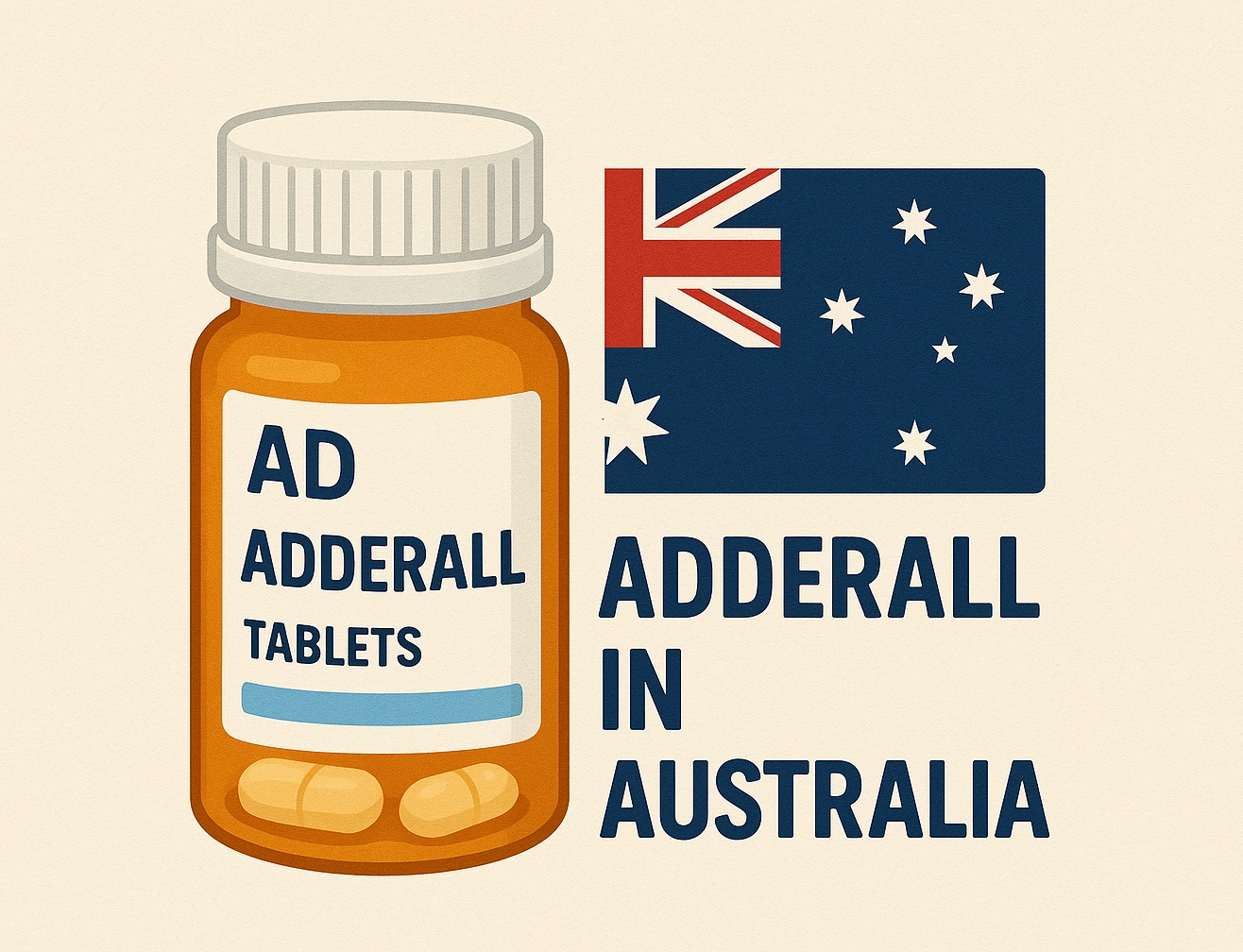Adderall, a well-known prescription medication used to treat Attention Deficit Hyperactivity Disorder (ADHD) and narcolepsy, is a combination of amphetamine salts. While widely prescribed in the United States, its legal status in Australia is more restrictive and often misunderstood.
This article explores the regulatory landscape of Adderall in Australia, including its scheduling, availability, alternatives, and the legal risks of importation or possession without proper authorization.
Is Adderall Legal in Australia?
No, Adderall is not approved for sale or prescription in Australia. It is classified as a Schedule 8 controlled substance, indicating a high potential for abuse and dependence. Schedule 8 drugs require strict regulation and monitoring, and Adderall specifically is not listed on the Australian Register of Therapeutic Goods (ARTG).
This means:
- Doctors in Australia cannot legally prescribe Adderall
- Pharmacies cannot dispense it
- It cannot be legally purchased within the country
What Happens If You Import Adderall?
Attempting to import Adderall into Australia—whether by mail, courier, or bringing it in your luggage—can result in serious legal consequences.
Under Australian Border Force (ABF) and Therapeutic Goods Administration (TGA) regulations:
- Importing Adderall without a permit is illegal
- Violations can result in seizure, fines, or criminal charges
- Even possessing a small amount without medical authorization may lead to prosecution
There is a Personal Importation Scheme, but Adderall does not qualify because it is not approved in Australia. To legally import it, one would need:
- A valid prescription from an Australian doctor (not possible for Adderall)
- A TGA special import permit (very rarely granted and typically only for clinical trials or exceptional circumstances)
Why Is Adderall Not Available in Australia?
Australia favors alternative medications that are considered equally effective and carry a lower risk of misuse or dependency. Approved ADHD medications in Australia include:
| Medication | Brand Name | Availability |
|---|---|---|
| Dexamphetamine | Dexedrine, Spansule | Schedule 8 |
| Methylphenidate | Ritalin, Concerta | Schedule 8 |
| Lisdexamfetamine | Vyvanse | Schedule 8 |
| Atomoxetine | Strattera | Schedule 4 (less regulated) |
These medications have more predictable pharmacokinetics or less abuse potential than Adderall, particularly Vyvanse (lisdexamfetamine), which is prodrug-based, making it harder to misuse.
What If You Have an Adderall Prescription from Another Country?
Even if you’re a traveler or student arriving in Australia with a U.S. prescription for Adderall, you must declare it at the border, and only carry:
- Up to a 3-month supply
- A valid prescription clearly showing your name, dosage, and prescribing doctor
However, this does not guarantee entry approval. The Australian government reserves the right to deny the import or possession of any drug not listed in the ARTG.
Legal Risks and Penalties
Possession or use of Adderall without authorization in Australia falls under illicit drug offenses, with potential penalties including:
- Fines up to AU$220,000
- Imprisonment (up to 2 years or more depending on quantity and intent)
- Permanent criminal record
This applies even if your intent was personal use.
Summary
| Category | Adderall Status in Australia |
|---|---|
| Legal for prescription use | ❌ No |
| Listed on ARTG | ❌ No |
| Import with foreign prescription | ⚠️ Extremely limited and high-risk |
| Recommended alternatives | ✔ Vyvanse, Ritalin, Dexamphetamine |
| Possession penalties | ⚠ Fines, legal action, possible jail time |
Legal Adderall Alternatives in Australia
Adderall is not available or legal in Australia, but several regulated, effective, and approved alternatives are prescribed for ADHD and narcolepsy. These vary in class, mechanism, and suitability depending on individual profiles.
Stimulant-Based Alternatives
1. Lisdexamfetamine (Brand: Vyvanse)
- Type: Prodrug stimulant (amphetamine class)
- Use: ADHD (first-line treatment), binge eating disorder
- Pros: Long-acting, smoother onset, reduced abuse risk
- Status: Schedule 8, widely prescribed
2. Dexamphetamine Sulfate
- Type: Immediate-release stimulant
- Use: ADHD, narcolepsy
- Pros: Fast onset, customizable dosing
- Cons: Requires multiple doses/day; higher misuse potential
- Status: Schedule 8, common in public health system
3. Methylphenidate (Ritalin, Concerta)
- Type: CNS stimulant, dopamine-norepinephrine reuptake inhibitor
- Use: ADHD, narcolepsy
- Variants:
- Ritalin IR: Immediate, short-acting
- Concerta: Extended-release formulation
- Status: Schedule 8
Non-Stimulant & Alternative Use Nootropics
4. Modafinil (Brand: Modavigil)
- Type: Wakefulness-promoting agent (eugeroic)
- Use: Narcolepsy, obstructive sleep apnea, shift work disorder
Off-label for ADHD - Pros: Improves alertness, attention, and executive function
- Cons: Not first-line for ADHD; may cause insomnia or headache
- Status: Schedule 4 (prescription-only, less regulated than stimulants)
5. Atomoxetine (Brand: Strattera)
- Type: Non-stimulant ADHD medication (NRI)
- Use: ADHD (especially in those who cannot tolerate stimulants)
- Pros: Non-addictive, 24-hour coverage, lower abuse potential
- Cons: Takes weeks to reach full effect
- Status: Schedule 4, PBS-subsidized
Summary Table
| Medication | Class | Primary Use | Controlled Schedule | Key Advantage |
|---|---|---|---|---|
| Vyvanse | Amphetamine (XR) | ADHD | S8 | Long-acting, closest to Adderall XR |
| Dexamphetamine | Amphetamine (IR) | ADHD/Narcolepsy | S8 | Closest to Adderall IR |
| Ritalin | Methylphenidate | ADHD/Narcolepsy | S8 | Fast-acting focus enhancer |
| Concerta | Methylphenidate | ADHD | S8 | Extended-release convenience |
| Modafinil | Eugeroic | Narcolepsy/ADHD (off-label) | S4 | Wakefulness without strong stimulation |
| Atomoxetine | Norepinephrine RI | ADHD | S4 | Non-stimulant, good for anxiety-prone users |
Final Thoughts:
Adderall remains illegal for prescription or sale in Australia, and importing it without special approval is a serious offense. If you are an ADHD patient relocating or traveling to Australia, it’s critical to consult with a licensed Australian physician to explore legal and effective alternatives that comply with the country’s medical regulations.
